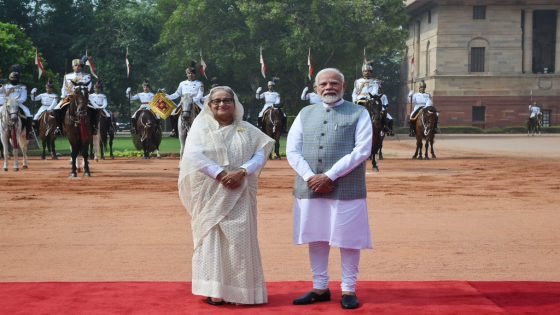The inherent strength of India-Bangladesh relationship was once again in evidence as the Prime Minister of Bangladesh, Sheikh Hasina, decided to visit New Delhi days after attending the swearing-in ceremony of Prime Minister Narendra Modi. The ease with which the top leadership in Delhi and Dhaka now interact and engage each other is a tribute to the manner in which Modi and Hasina have managed to build this important partnership over the last decade, often under very difficult circumstances. If Modi had to contend with the opposition at the state level in West Bengal, where the ruling party decided to veto the Teesta Pact, Hasina had to face the anti-India constituency in Bangladesh. Despite this, both leaders stood firm in their belief that building resilience in this partnership is important for not only bilaterally but also regionally.
“Trusted Friend”
On her first official overseas visit to any country since she returned to power earlier this year in January, Hasina underlined: “India is our major neighbour, trusted friend and regional partner. Bangladesh-India relations are growing at a fast pace.” Modi reciprocated by highlighting the special nature of this visit: “Because she is our first state guest after our government returned to power for the third term.”
Also Read | “Unilateral Discussions…”: Mamata Banerjee To PM On Bangladesh Talks
The visit saw the signing of 10 Memoranda of Understanding (MoUs), which covered areas as diverse as digital and green partnerships, maritime cooperation, and, notably, the ‘Shared Vision for India-Bangladesh Rail Connectivity’. The joint statement outlined a shared bilateral and regional vision for peace, prosperity and development, driven by connectivity, commerce and collaboration. In that spirit, some important new initiatives were announced, including e-visa for patients from Bangladesh, new train and bus services, joint technical committee for Ganga Water Treaty, visit of an Indian technical team to Bangladesh for a mega project to conserve and manage the Teesta river, export of 40 MW of power from Nepal to Bangladesh through Indian grid, and training of Bangladeshi police officers. Building Bangladesh’s defence capability has also emerged as a priority, with the two nations deciding “to explore defence industrial cooperation for modernisation of the Armed Forces of Bangladesh”.
Identifying Opportunities, Counterbalancing China
Hasina will be visiting China in July. It is a sign of a new maturity in India-Bangladesh relations that the two nations continue to work closely together even as they develop their ties with other nations. New Delhi has not stopped Dhaka from its engagement with China but it has some concerns that Hasina has always ensured are addressed. Since 2020, China has been regularly expressing an interest in the $1 billion project to develop the Teesta river. Last year, Beijing submitted a formal proposal.
Also Read | Tripura Chief Minister Gifts 500 Kg Of Queen Pineapples To Bangladesh PM
For Bangladesh, this has been a long-standing priority. The Manmohan Singh government had an agreement in place in 2011, which could not be taken forward due to the opposition from the Chief Minister of West Bengal. For Hasina, the situation had become unsustainable, with the opposition clamouring for a response amidst moves by the Chinese. Her visit before going to China was a wise move to ensure that New Delhi had a chance to respond, and India has done well to respond to the initiative. The decision to send an Indian technical team to Dhaka for talks on the conservation and management of Teesta river is an indication that New Delhi is not willing to cede its strategic space in the neighbourhood despite domestic challenges. The decision to commence technical negotiations for the renewal of the 1996 Ganga Water Treaty is also a timely move to respond to the concerns in Dhaka on an issue that is a priority for the Hasina government.
Rock-Solid Ties
For India, the importance of Bangladesh cannot be overstated as New Delhi seeks to emerge as an Indo-Pacific player with the Bay of Bengal as the regional epicentre. For Bangladesh, a partnership with India remains key to realising its full potential as a critical economic and strategic player in the region. As the two nations become more ambitious in defining their strategic outlooks, their bilateral partnership will continue to be a key enabler in shaping their behaviour.
The China factor, while important, should not be overstated. India-Bangladesh ties today stand on their own merit. Hasina and Modi have ensured that by focusing concrete tangible outcomes for the people of both nations, they have redefined the contours of what an ideal partnership between two neighbours should look like. Mutual respect, mutual interest and mutual sensitivity have made this relationship an exemplar for all others.
[Harsh V Pant is Vice President for Studies and Foreign Policy at ORF.]
Disclaimer: These are the personal opinions of the author
Source Agencies


